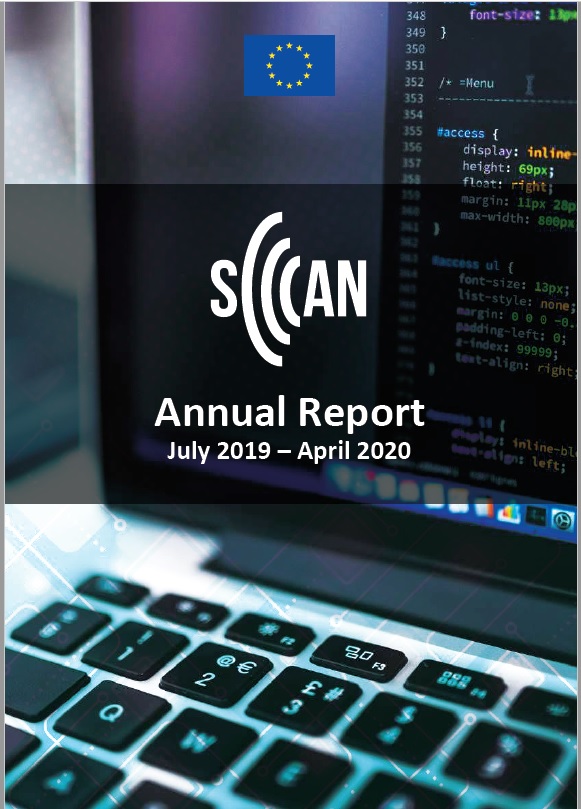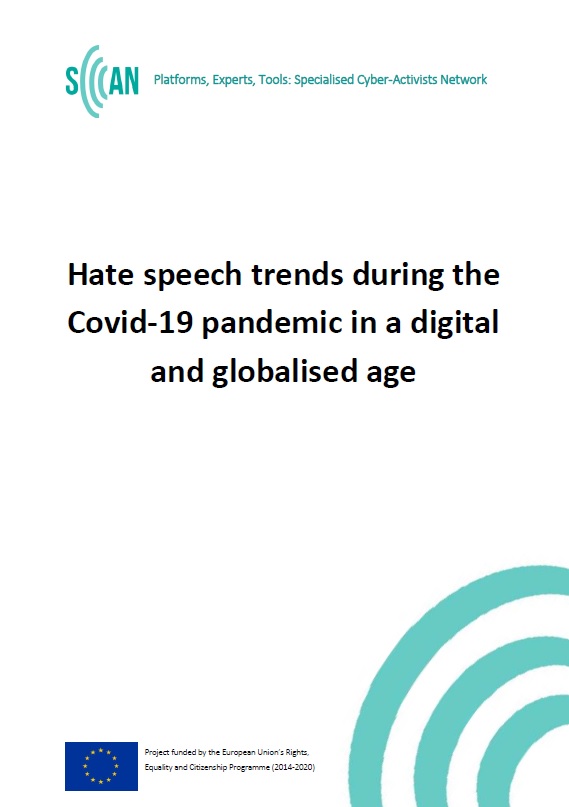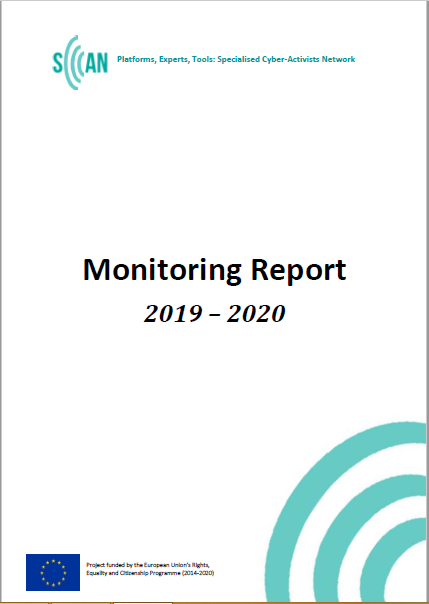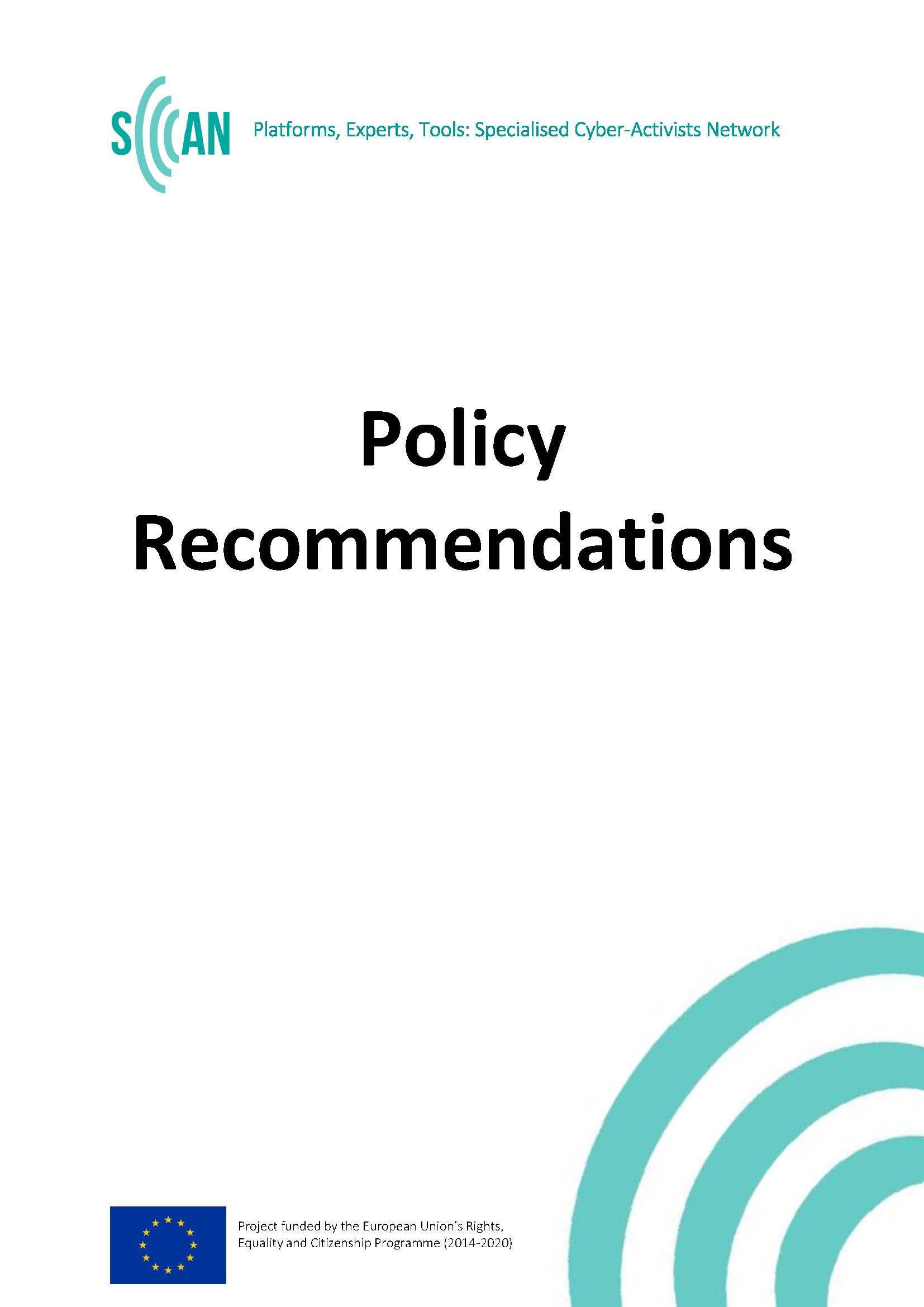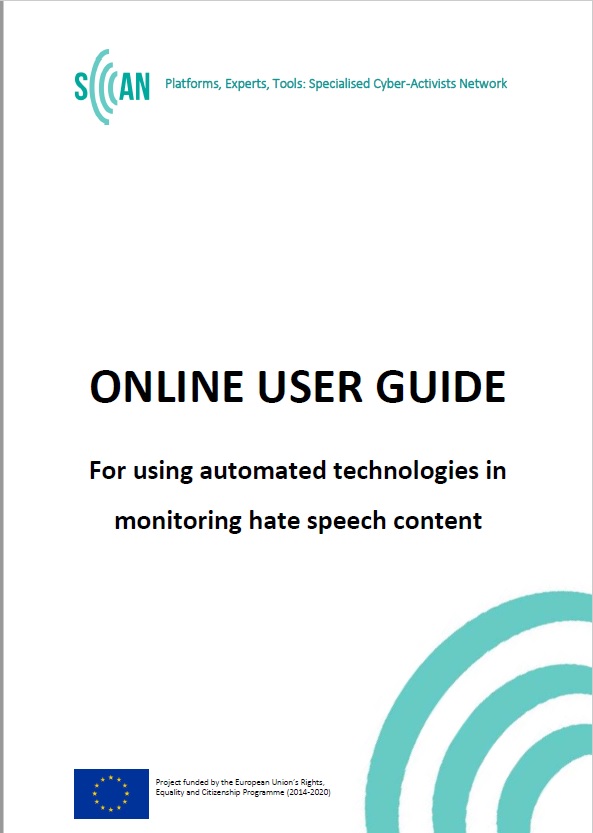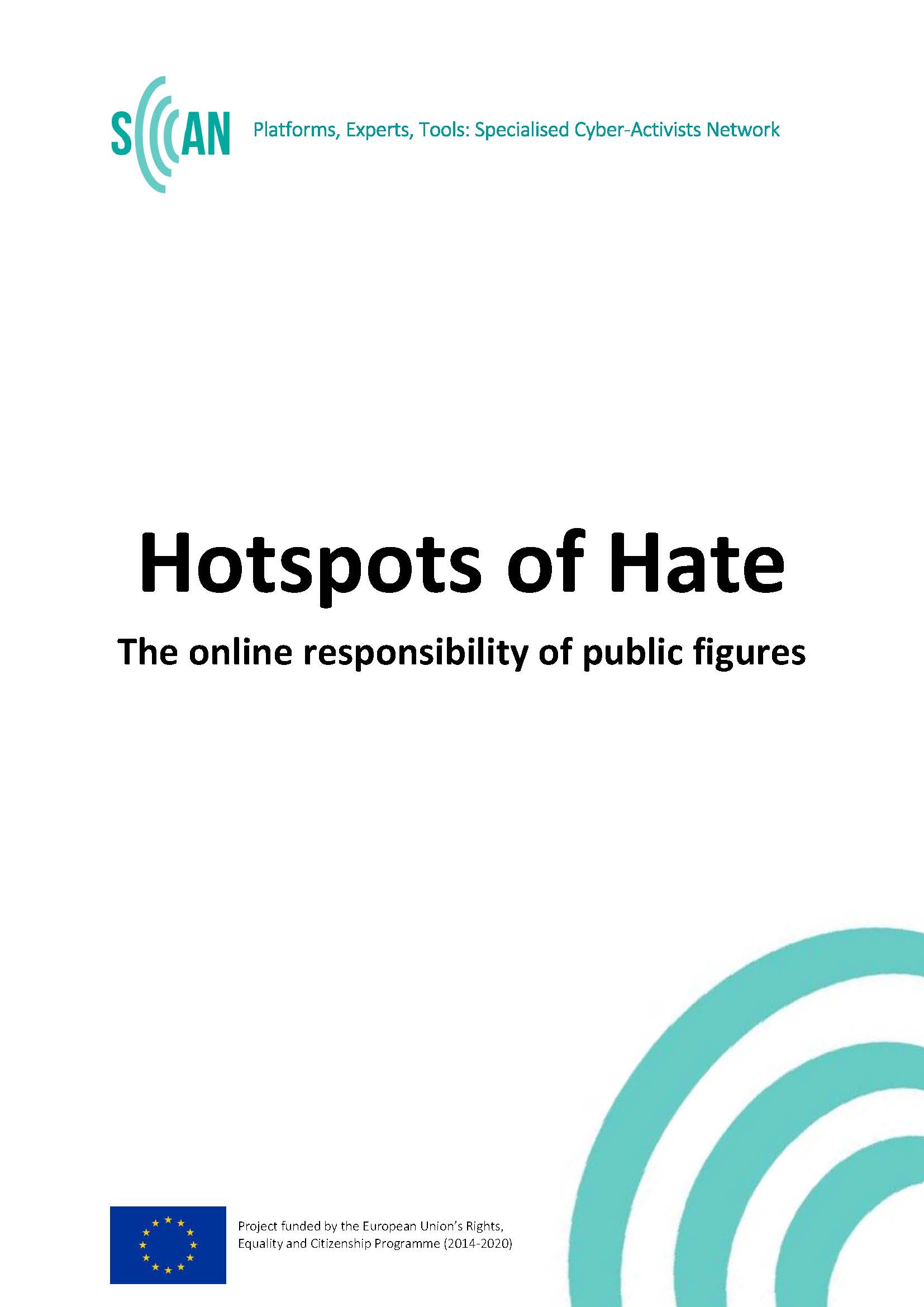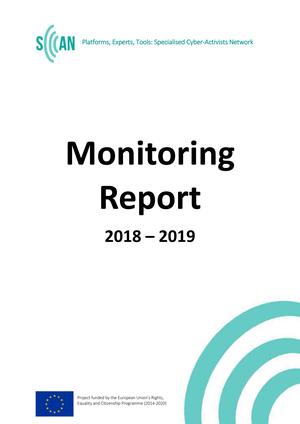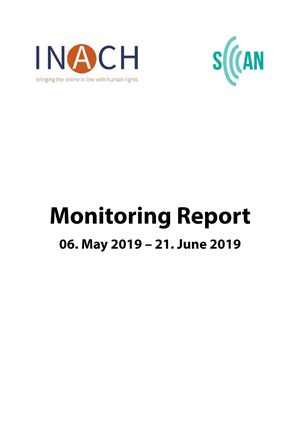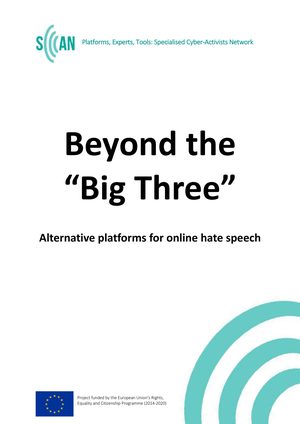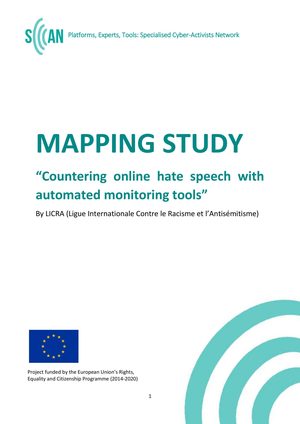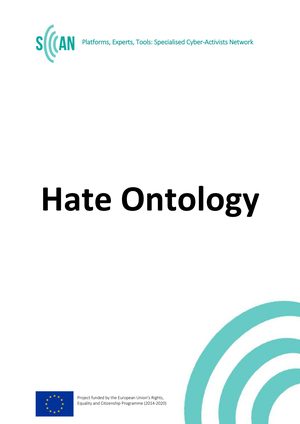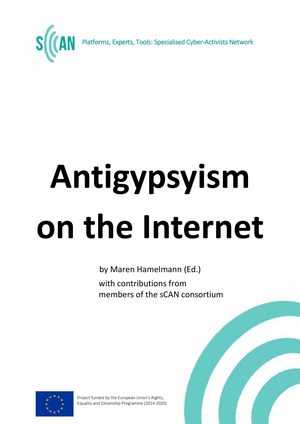Resources and publications
Do you want to know more about our goals? Check out below a range of resources and publications on the latest issues in regards to online hate speech.
sCAN Annual Report: 2019-2020
The internet is an integral part of everyday communication worldwide. While it is most often used in a peaceful manner to communicate with friends or freely express one’s opinion on a diverse range of topics, some users spread hatred and incite to violence against certain groups or persons. The sCAN project, therefore, was designed to tackle three areas deemed crucial in this endeavour. This Annual Report presents the sCAN project’s results for the second year of the project (July 2019 – April 2020) in the three areas of combating hate speech covered by the project’s activities.
Also available in:
sCAN Advanced Monitoring Training Manual
The sCAN project’s core mission – namely, the development of transnational comprehensive practices for identifying, monitoring, analysing, reporting and counteracting online hate speech – forms the foundation for this training manual. The project includes the design and implementation of advanced monitoring trainings for project
partners and counter-activists. Between 2019 and 2020, four trainings were organized by the project partners from France, Italy, Austria, and Belgium. In total, 70 participants from all over Europe took part in overall four trainings held in Paris, Palermo, Vienna, and Brussels.
Hate speech trends during the Covid-19 pandemic in a digital and globalised age
Since the beginning of 2020, a global infectious disease has shattered human social, economic and political life conditions in many countries. Today on all continents a growing part of humanity is on lockdown. As the pandemic expands, online phenomena of conspiracy theories, rumours, fake news and hateful contents connected to this global disease are growing. This analytical paper aims at analysing online hateful trends on this pandemic period including an historical perspective.
Second Monitoring Report: 2019 – 2020
During the second year of the project, the sCAN partner organisations participated in two monitoring exercises, one with the European Commission and one with the International Network Against Cyber Hate (INACH) and the project Open Code for Hate-Free Communication (OpCode). The goal of the monitoring exercises was to evaluate the adherence of the IT companies Facebook, Twitter, YouTube and Instagram to the Code of Conduct on countering illegal hate speech online, developed in 2016 by the European Commission. The sCAN partners have already been participating in previous monitoring exercises organised by the European Commission and INACH.
Also available in:
Policy Recommendations
During the past two years, the sCAN partners have worked together closely to analyse and monitor hate speech online and to develop online and offline trainings. We made our insights available to the larger public and contributed to building capacities in civil society to combat hate speech together. During our activities we gathered valuable experiences and collected ideas for improvement. All stake-holder groups are called upon to intensify their efforts to ensure an online environment that is respect-ful and inclusive for all users.
We would like to share our experiences and provide recommendations for the institutions of the Eu-ropean Union, national authorities and public institutions, politicians and public figures, social media companies, media and journalists as well as civil society organisations and individual internet users on how to better combat all forms of hate speech online.
Also available in:
Online User Guide – For using automated technologies in monitoring hate speech content
This User Guide has been developed thanks to a range of automated monitoring tools tested by two sCAN partners, jugendschutz.net and Licra. The main objective was to experiment during two testing sessions some selected tools to list their respective advantages and downward sides. All automated tools tested have proved to be satisfyingly efficient regarding a list of criteria developed for helping help civil society organisations and cyber-activists facing the issue of monitoring online hate speech. This guide provides all elements regarding the installation and the use of automated monitoring tools inexpensive and easy to get familiar with. It also helps to identify and integrate automated monitoring technologies’ benefits as a new complementary way to tackle online hate speech.
Intersectional Hate Speech Online
The concept of intersectional discrimination originates from the movement of black feminism. The term intersectionality was coined by American legal scholar Kimberlé Crenshaw, who described the specific discrimination experienced by black women as “the combined effects of practices which dis-criminate on the basis of race, and on the basis of sex.”
Since then, the concept of intersectionality has been adopted to describe different social settings where multiple grounds of discrimination intersect to create a distinct form of discrimination that is more than just the sum of its different aspects. While the concept has traditionally been applied to cases of (offline) discrimination, e.g. in employ-ment or housing, intersectionality also plays a role in hate speech online, whenever a group or an individual is attacked for more than one of their protected characteristics.
Also available in:
Hotspots of Hate – the online responsibility of public figures
Social media have not only changed the way we communicate and interact, but also shape public opinion and political debate as more and more people use social media as their primary source of political information. In several European countries, leading politicians and other public figures use their online presence to incite hatred or to encourage hate speech by posting biased and populist comments to their social media profiles. A culture of online communication in which hate speech appears to be accepted (or even encouraged) can lead to a poisoned political debate and violent threats against the perceived political “ennemy” and even turn violent. In addition to the responsibility of public figures not to disseminate or encourage hate speech and to effectively moderate the comments on their social media profiles, civil society has the responsibility to discourage hate speech and show solidarity with the people and communities targeted online.
Also available in:
Monitoring the web to assess the responsiveness of the platforms
During the first year of the project, the sCAN partner organisations participated in two joint monitoring exercises with the European Commission and the International Network Against Cyber Hate (INACH). The goal of the monitoring exercises was to evaluate the adherence of the IT companies Facebook, Twitter, YouTube and Instagram to the Code of Conduct on countering illegal hate speech online, developed in 2016 by the European Commission. Between 2016 and 2018 there have been four monitoring periods to evaluate the Code of Conduct organised by the European Commission. Most sCAN partners have already been participating in the previous monitoring exercises organised by the European Commission and INACH
Also available in:
Press Release – Monitoring Exercise from 6th May 2019 till 21st June 2019
A silent monitoring finds drastic decline in YouTube’s removal performance
Press release – Between 6 May 2019 and 21 June 2019, the International Network Against Cyber Hate (INACH) and the sCAN project jointly organised a monitoring exercise to evaluate the adherence of the IT companies Facebook, Twitter, YouTube and Instagram to the Code of Conduct on countering illegal hate speech online, developed by the European Commission in 2016.
The participating organisations reported 432 cases to the IT companies Facebook, Twitter, YouTube and Instagram.
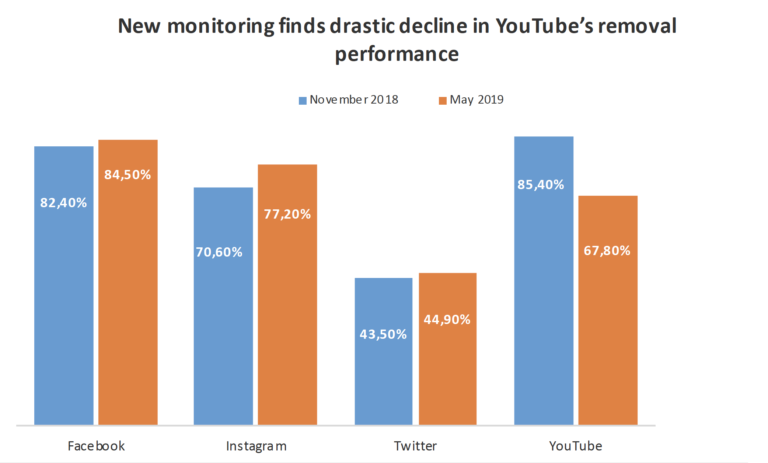
sCAN Annual Report: May 2018 – June 2019
The internet is an integral part of everyday communication worldwide. While it is most often used in a peaceful manner to communicate with friends or freely express one’s opinion on a diverse range of topics, some users spread hatred and incite to violence against certain groups or persons. The international nature of the internet and its global interconnectedness necessitate a transnational approach to combat hate speech online. In order to effectively counteract cyber hate, a multidimensional approach is needed. The sCAN project, therefore, was designed to tackle three areas deemed crucial in this endeavour. This Annual Report presents the sCAN project’s results for the first project year (May 2018 – June 2019) in the three areas of combating hate speech covered by the project’s activities. Therefore, the transnational consortium, implementing the EU project sCAN – Specialised Cyber Activist Network, has 1. gathered tools and pooled resources across countries, 2. conducted joint research and monitoring excerices to achieve an in-depth understanding of the phenomenon and to make trends visible as well as it has 3. conceptualised, developed and implemented online as well as offline training courses to build capacities of NGOs and individual activists to counter hate speech in a diverse manner.
Also available in:
Beyond the “Big Three”: Alternative platforms for online hate speech
In recent years, most international studies on hate speech online have focused on the three platforms traditionally considered the most influential: Facebook, YouTube and Twitter. However, their predominance as the biggest international social networks is no longer uncontested. Other networks are on the rise and young users especially lose interest in the ‘old’ platforms. As hate speech moderation increases on the major social media platforms, hate groups and extremists turn to other networks where community guidelines against hate speech are less strictly enforced. Some of those alternative platforms, like VK.com or Gab.ai, have acquired a broad international audience and are considered ‘safe havens’ by far-right or right-wing extremist activists. This analysis offers an overview of the most prevalent social media platforms and websites used for disseminating hate speech in the countries of the sCAN project partners.
Also available in:
Diverging responsiveness on reports by trusted flaggers and general users – 4th evaluation of the EU Code of Conduct: sCAN project results
SCAN partners agree that while there is an improved effort from social media companies to remove illegal hate speech, monitoring exercises must continue with the support of European institutions in order to maintain and improve results. As users disseminating hate content increasingly moved to closed groups or to other platforms not included in the monitoring exercise, and with the changing discourse among far-right users, as they feel confident to significantly gain influence at the European elections in May 2019, it is clear that new challenges and threats are on the horizon. Continued efforts of monitoring and counter-action are pivotal in ensuring a safe and respectful online space across the EU and beyond.
Mapping Study: “Countering online hate speech with automated monitoring tools”
This report aims at presenting, defining and analysing existing automated tools to monitor online hateful content as well as its limits beyond the spread of online hatespeech across the Web 1.0 and 2.0. The report provides an in-deep analysis of ways in monitoring online hate speech that are available and straightforward for individual experts, non-profit organisations and Human rights activists. Automated intelligent technologies that provide to CSO’s, decision makers and online activists a better environment in conducting monitoring project are at the heart of a new way to tackle any form of hate speech across the World Wide Web, including social media. In this mapping study, we will analyse which tools are available to individuals to counter hate speech and how to improve the prospects of removal of reported hate speech.
A Hate Ontology for better understanding of key definitions
With this publication, the sCAN project partners, namely LICRA (France), Human Rights House Zagreb (Croatia), jugendschutz.net (Germany), CESIE (Italy), Zara – Zivilcourage und Anti-Rassismus-Arbeit (Austria), Spletno oko (Slovenia), ROMEA (Czech Republic), and the Latvian Centre for Human Rights (Latvia), bring their contribution to the further expansion of the body of knowledge and literature on online hate speech, to enable researchers, cyber activists, and the civil society representatives to better recognise and contrast the phenomenon of cyber hate.
Analytical Paper: Antigypsyism on the Internet
Sinti and Romani people have been living in Europe for more than six centuries. The history of antigypsyist rhetoric, discrimination and political persecution is just as long. Even though many countries have by now recognized Sinti and Roma as a national minority, intolerance remains and deeply embedded stereotypes still have a severe impact on the lives and opportunities of persons affected by antigypsyism. Today most antigypsyist rhetoric takes place online. In the analysed countries, criminalisation, welfare chauvinism and de-humanisation are the most common narratives. They are spread on Social Media, but also in (online) media outlets and the comment sections of articles and videos. Frequent tools used to spread antigypsyism are fake news reports and decontextualized images and videos.
Also available in:
Contact us
Do you any question and requests related to our project?
Our team will be glad to answer you. You can write an email to our address:


